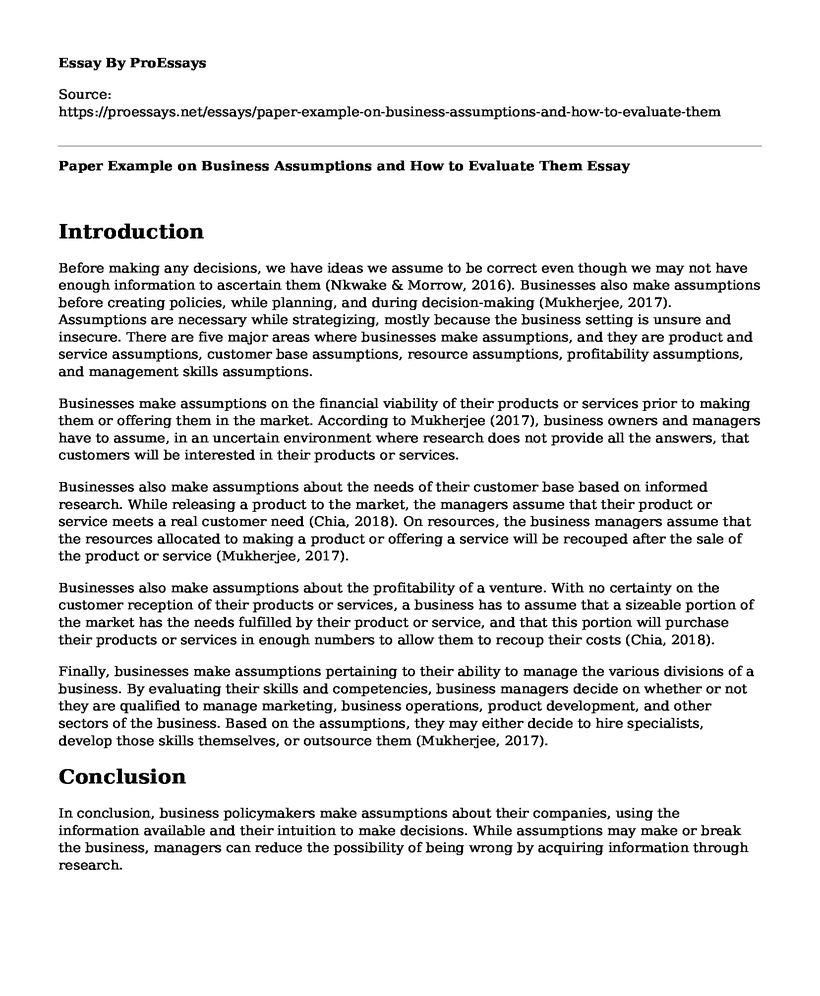Introduction
Before making any decisions, we have ideas we assume to be correct even though we may not have enough information to ascertain them (Nkwake & Morrow, 2016). Businesses also make assumptions before creating policies, while planning, and during decision-making (Mukherjee, 2017). Assumptions are necessary while strategizing, mostly because the business setting is unsure and insecure. There are five major areas where businesses make assumptions, and they are product and service assumptions, customer base assumptions, resource assumptions, profitability assumptions, and management skills assumptions.
Businesses make assumptions on the financial viability of their products or services prior to making them or offering them in the market. According to Mukherjee (2017), business owners and managers have to assume, in an uncertain environment where research does not provide all the answers, that customers will be interested in their products or services.
Businesses also make assumptions about the needs of their customer base based on informed research. While releasing a product to the market, the managers assume that their product or service meets a real customer need (Chia, 2018). On resources, the business managers assume that the resources allocated to making a product or offering a service will be recouped after the sale of the product or service (Mukherjee, 2017).
Businesses also make assumptions about the profitability of a venture. With no certainty on the customer reception of their products or services, a business has to assume that a sizeable portion of the market has the needs fulfilled by their product or service, and that this portion will purchase their products or services in enough numbers to allow them to recoup their costs (Chia, 2018).
Finally, businesses make assumptions pertaining to their ability to manage the various divisions of a business. By evaluating their skills and competencies, business managers decide on whether or not they are qualified to manage marketing, business operations, product development, and other sectors of the business. Based on the assumptions, they may either decide to hire specialists, develop those skills themselves, or outsource them (Mukherjee, 2017).
Conclusion
In conclusion, business policymakers make assumptions about their companies, using the information available and their intuition to make decisions. While assumptions may make or break the business, managers can reduce the possibility of being wrong by acquiring information through research.
References
Chia, R. (2018). Foundations of management knowledge: Assumptions and limitations. Glasgow: University of Glasgow
Nkwake, A. M., & Morrow, N. (2016). Clarifying concepts and categories of assumptions for use in evaluation. Evaluation and Program Planning, 1(1), 1-20, DOI: 10.1016/j.evalprogplan.2016.05.014
Mukherjee, B. (2017). #5 Common assumptions made about businesses. Entrepreneur India. Retrieved from https://www.entrepreneur.com/article/304199 on 31 August 2018
Cite this page
Paper Example on Business Assumptions and How to Evaluate Them. (2022, Jul 25). Retrieved from https://proessays.net/essays/paper-example-on-business-assumptions-and-how-to-evaluate-them
If you are the original author of this essay and no longer wish to have it published on the ProEssays website, please click below to request its removal:
- SWOT Analysis for Hotel Example: Sheraton Hotel & Resorts
- Report Example on the Best Western Group of Hotels
- Questions and Answers on The Companies Act of 2006
- The Imperial Hotel-London Case Study
- Service Delivery System (SDS) and Customer Experience Analysis (CEA) Paper Example
- Essay Example on Success of Restaurant: Uniting Production and Service Delivery
- Essay Example: Impact and Importance of Migration in the Hotel Industry in Singapore







